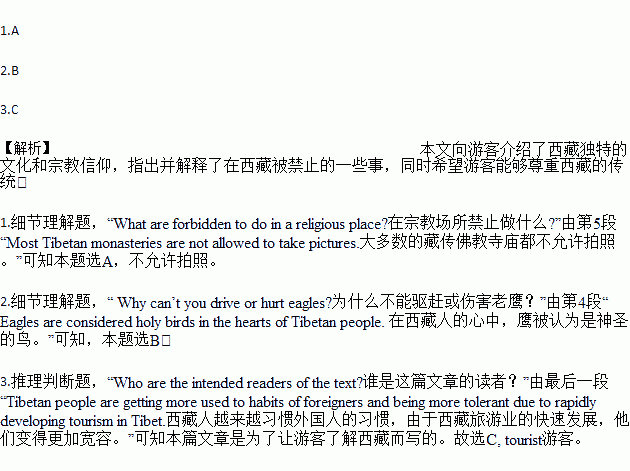题目内容
Tibetan people are friendly and easy to get along with. However, Tibetans have different ways of behavior in many aspects due to their unique culture and religion. Be sure to respect local customs and be polite.
Don’t enter a monastery without permission. Don’t smoke in monasteries. Don’t touch Buddha statues, religious objects or prayer flags. Walk around monasteries (寺院), temples, dagobas, Mongolian cairns (Mani piles) and other religious structures in clockwise order with the exception of the Bon sites.
Don t step on the threshold when entering a tent, house, or monastery. Don’t touch the head of a Tibetan. The head is considered as a sacred part of the body. Remember to cross your legs when you are asked to have a seat. Don’t stretch your legs with feet pointing to others.
Don’t drive away or hurt eagles. Eagles are considered holy birds in the hearts of Tibetan people. Don’t disturb or injure cows or sheep with red, green or yellow ribbons because they are Tibetan sacrifice to worship gods.
Don’t take photos without permission. You’d better ask for permission before taking pictures of Tibetan people. Most Tibetan monasteries are not allowed to take pictures or you need to pay.
Tibetan people are getting more used to habits of foreigners and being more tolerant due to rapidly developing tourism in Tibet. However, we still hope you can show respect to Tibetan traditions and behave well since their unique lifestyle is part of the charm of Tibet.
1.What are forbidden to do in a religious place?
A. Take a photo. B. Talk with Tibetans.
C. Walk around. D. Make a prayer.
2.Why can’t you drive or hurt eagles?
A. Tibetan people are animal lovers.
B. Eagles are holy birds to Tibetans.
C. Tibetans use them to worship gods.
D. They are protected by local laws.
3.Who are the intended readers of the text?
A. Teachers. B. Locals.
C. Tourists. D. Reporters.
 小学夺冠AB卷系列答案
小学夺冠AB卷系列答案 ABC考王全优卷系列答案
ABC考王全优卷系列答案

 ape.
ape.